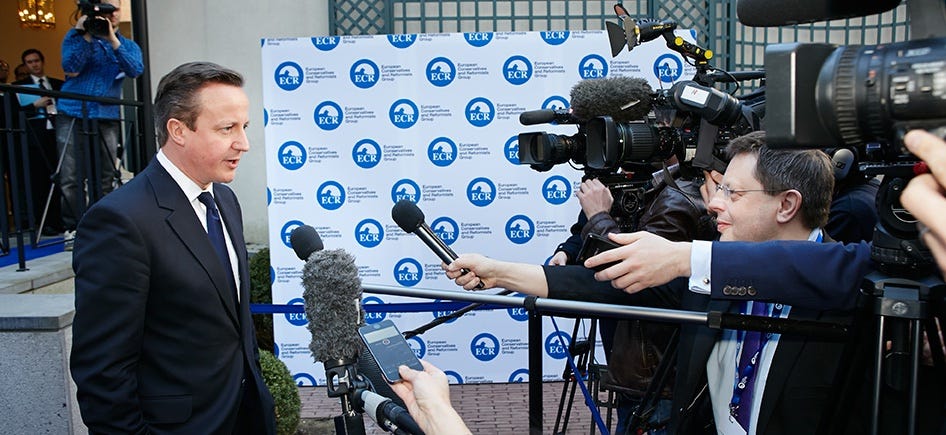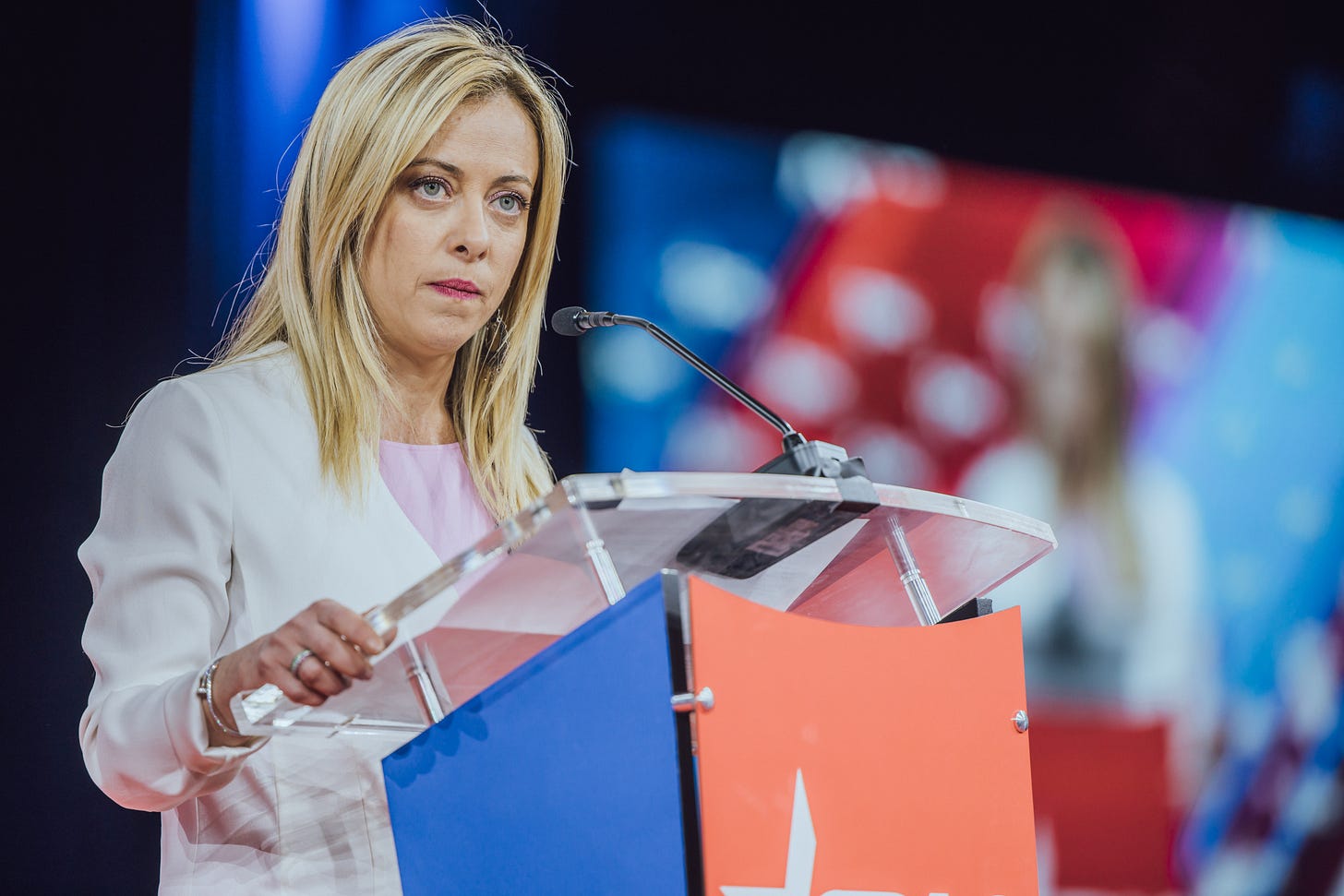The unnoticed 2009 decision that pushed the UK to where it is today
David Cameron's decision to ally with the far right at European level went mostly unreported in Britain. But the Tory MEPs warning about the impacts at the time now look like soothsayers.
We’re just a little over two months away from the EU election, and to prepare my reporting I thought it would be useful to go back and look over my notes from the previous elections I covered in 2019, 2014 and 2009. One thing jumped out at me from when I was living in London in 2009. David Cameron, opposition leader at the time, had just taken the decision to remove the Conservative Party from the pan-European centre-right European Peoples Party (EPP) and found a new eurosceptic anti-federalist group called the European Conservatives and Reformists (ECR).
It was done because of pressure from the eurosceptic wing of the British Conservative party, spearheaded by Tory MEP Daniel Hannan. Cameron made the promise during his leadership campaign in order to get the votes of that euroskeptic wing, and those votes put him over the top to become head of the party. It was a risky short-term gambit that put his own political career over the long-term future of the UK, a consistent theme of Cameron’s premiership which foreshadowed his fateful Brexit referendum decision six years later. Incredibly, David Cameron (who resigned as prime minister after the 2016 Brexit vote) has just been brought back into the government by Rishi Sunak and is now foreign minister - and is considered the most respectable person in the current government.
I was covering EU environment and climate policy at the time and interviewed British Conservative MEP Caroline Jackson, former chair of the European Parliament’s environment committee. She had already decided to stand down and not seek re-election due to Cameron’s decision. She could not be part of the new ECR group, she said, decrying her party’s alliance with “two parties with the unfortunate acronyms of ODS [odious] and PiS [piss].” It wasn’t only with me that she was sounding the alarm. She was quite vocal in opposing the move, and had penned an op-ed in the Brussels newspaper European Voice (which I later went on to work for) warning that, “driven by ideology rather than their traditional pragmatism, the UK Conservatives are careering off the political track.”
“The Conservatives’ decision to end their relationship with the EPP is based on an ideological aversion to European federalism,” she wrote. “But Conservative successes in Europe have been based on pragmatism. There are federalist philosophers in the Parliament, but their siren voices are not heard or reflected where the real business is done – in the legislative committees. Conservatives should stick to the pragmatism that has served them best.”
Jackson wasn’t the only one raising alarm about Cameron’s dangerous game. Other Conservative MEPs such as parliament vice president Edward McMillan-Scott were also speaking out (unlike Jackson, he quite the party and joined the Liberal Democrats). Even the Obama administration at the time was warning that the move would isolate the UK in Europe and majorly weaken London’s influence on the continent. Obama official and Democratic heavyweight John Podesta said it was worrying that “under David Cameron’s leadership, the Conservative Party’s traditional euroskepticism has become more extreme” and they are “forming a new parliamentary group with a maverick collection of racist, homophobic, and xenophobic members of the European Parliament. It is hardly good for Britain’s prestige when its European parliamentarians sit with those who have argued the election of a black US president hails the end of civilization — the decision also illustrates Cameron’s willingness to forgo political influence to placate extreme elements of his own party.” Liberal Democrat leader Nick Clegg, who a year later joined with Cameron in a coalition government, said the Tories were allying with “nutters, anti-Semites, people who deny climate change exists, and homophobes.”
And yet, at the time, Cameron’s decision got very little attention in the British press - either before the election or after. Nor did Cameron’s hugely consequential veto of the eurozone pact in 2011. Nor did the Conservatives’ lurch to the right after being defeated by Nigel Farage in the 2014 EU election (making UKIP the largest British party in the European Parliament). Nor did Cameron’s 2015 campaign pledge to hold a referendum on EU membership. From 2009 to 2016, each new step that the Conservatives took toward taking the UK out of the European Union went unnoticed by the British press. And the voices warning about the path Cameron was putting the UK on went ignored, whether they were Tory politicians or senior White House officials. The signs of the Conservative Party’s drift toward the the far right were there to see for the past 15 years - but many didn’t want to see them. Suella Braverman, Liz Truss and Lee Anderson didn’t happen overnight.
On one thing, however, the naysayers were wrong back then. Warning of the new group’s “fragility”, Jackson warned that ahead of the 2009 EU election the Tories, “still cannot say which parties will make up the minimum of seven needed to form a group. Allies are being sought in the tangled undergrowth of eastern European politics. If the situation is as unstable as it appears, there is a serious risk that one or two parties may jump ship and join the bigger and much more attractive EPP between now and the UK’s general election.” But while the ECR had moments in the mid 2010s where it looked like it could disappear, it has recently strengthened under the leadership of far-right Italian Prime Minister Giorgia Meloni.
Since becoming ECR president in 2020, Meloni has collected into the group Europe’s most successful far-right parties such as the Sweden Democrats, True Finns, Vox, Reconquest and Greek Solution. Several of those parties were wooed away from ECR’s long-term rival far-right Identity & Democracy (ID) group of Marine Le Pen. Recent polls suggest the ECR is likely to emerge from June’s EU election as the third biggest group in the European Parliament. With ECR and ID both predicted to do well, far-right MEPs could even form the largest bloc in the legislature.
David Cameron’s 2009 decision did isolate the UK and put it on the path toward Brexit, as well as putting the Conservative Party itself on a path toward the populist far right. But the irony is that, in the ensuing years, Europe as a whole has moved toward the populist far right. That has put the ECR tantalisingly close to wielding real power at European level for the first time. But The Tories left the ECR after the took the UK out of the EU, even though there was no requirement to do so. While the group in the European Parliament is only for EU members, the wider European ECR party, like all the corresponding europarties of the parliamentary groups, has plenty of parties from countries outside the EU - including the Ulster Unionist Party in Northern Ireland which did not leave ECR like the Conservatives did.
The Tories never gave an explanation for why they quietly left the ECR in 2022. Perhaps as Meloni’s star was rising they were worried about the British press paying attention to the allies the Tories have collected at European level, even after ignoring it for so long. But the truth is that today’s Conservative Party fits right in within the ECR. There is little separating today’s Tories from Brothers of Italy or Vox. Oddly enough, a decade after isolating themselves by joining the ECR, the Tories have isolated themselves by leaving it - just as it appears poised to have the most influence its ever had since its creation.



